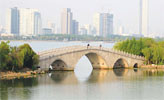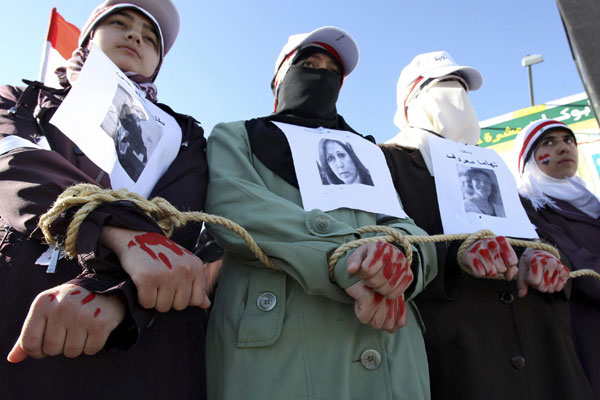Politics
'Catastrophic' picture emerges of Syrian town
Updated: 2011-05-16 22:28
(Agencies)
WADI KHALED, Lebanon - Carrying mattresses and bags of clothing, Syrians fleeing their homeland described a "catastrophic" scene Monday in a besieged border town that has been largely sealed off as the army tries to crush a two-month uprising.
At least eight people were killed Sunday in Talkalakh - the most recent casualties from a government crackdown that already has killed 850 people nationwide since mid-March, according to the National Organization for Human Rights in Syria. A town of about 70,000 residents, Talkalakh has been under a military siege since last week.
"The situation in the city is catastrophic," said Ahmad, 55, who crossed the border into Lebanon overnight Monday and asked to be identified only by his first name.
"If you walk in the streets of Talkalakh you can smell the dead bodies," he said.
Authorities justified the siege by saying the city was full of Islamic extremists who wanted to form an Islamic state, residents told The Associated Press.
"This is all not true," said Ahmad, who did not want to be further identified for fear of reprisals.
Another resident, who crossed into Lebanon Sunday, said heavy bombing in the past few days heavily damaged the Omar bin al-Khattab mosque inside the town.
More than 5,000 Syrians have fled to Lebanon in recent weeks as Syrian President Bashar Assad's security forces try to crush an uprising against his regime with gunfire, sieges and even shelling.
One resident said the conflict in Talkalakh has taken on dangerous sectarian tones.
Hamid, 45, who asked to be identified only by his first name, said shadowy, pro-regime gunmen known as "shabiha" are targeting Sunnis in the city.
Syria has multiple sectarian divisions, largely kept in check under Assad's heavy hand and his regime's secular ideology. Most significantly, the majority of the population is Sunni Muslim, but Assad and the ruling elite belong to the minority Alawite sect, an offshoot of Shiite Islam.
Talkalakh is a Sunni city, surrounded by 12 Alawite villages.
"The city of Talkalakh is empty of people. Most of them have fled to Lebanon," Hamid said.
At the Wadi Khaled crossing point, Syrians crossed a narrow river separating the countries by hopping along rocks in the narrow water.
Bursts of gunfire could be heard from the Syrian side Monday in Wadi Khaled, as Syrians continued to arrive, some using horses and mules to carry their belongings into Lebanon.
Hundreds of Syrian and Lebanese men were standing meters away from the border as bullets from the Syrian side buzzed overhead, sending them all running for cover.
Two ambulances were parked nearby to tend to any wounded Syrians.
One paramedic said a man crossed the border suffering from gunshot in his back shortly after midnight.
The Lebanese army was fortifying its positions in Wadi Khaled with a bulldozer, setting up sand dunes and putting up barbed wire to protect themselves from stray bullets.
Gunfire that came from the Syrian side of the border wounded a Lebanese soldier on Sunday, according to a Lebanese military official.
The National Organization for Human Rights in Syria said in a statement Monday that at least 34 people were killed in the past five days in the villages of Inkhil and Jassem near the southern city of Daraa, and five bodies were discovered in Daraa on Monday, raising the overall death toll to 850.
A resident of Inkhil told AP Monday that there were more than 70 tanks in Inkhil.
"The gunfire never stops," he said on condition of anonymity, adding that two hospitals in the area were taken over by security forces.
Reports of security forces taking over hospitals echoes the brutal crackdown against an uprising in Bahrain. International rights groups have said Bahrain's forces have targeted medical professionals who treated injured demonstrators.
E-paper

Green works
Wuxi becomes 'test case' for facing country's environmental challenges
The global rise of Chinese brands
China-EU trade on solid ground
ZTE banks on innovation
Specials

The song dynasty
There are MORE THAN 300 types of Chinese operas but two POPULAR varieties are major standouts

Cut above the rest
One of the world's oldest surgeons has performed more than 14,000 operations

From the ground up
Architect of Guangzhou Opera House has many projects under way, including 2012 Olympics.

